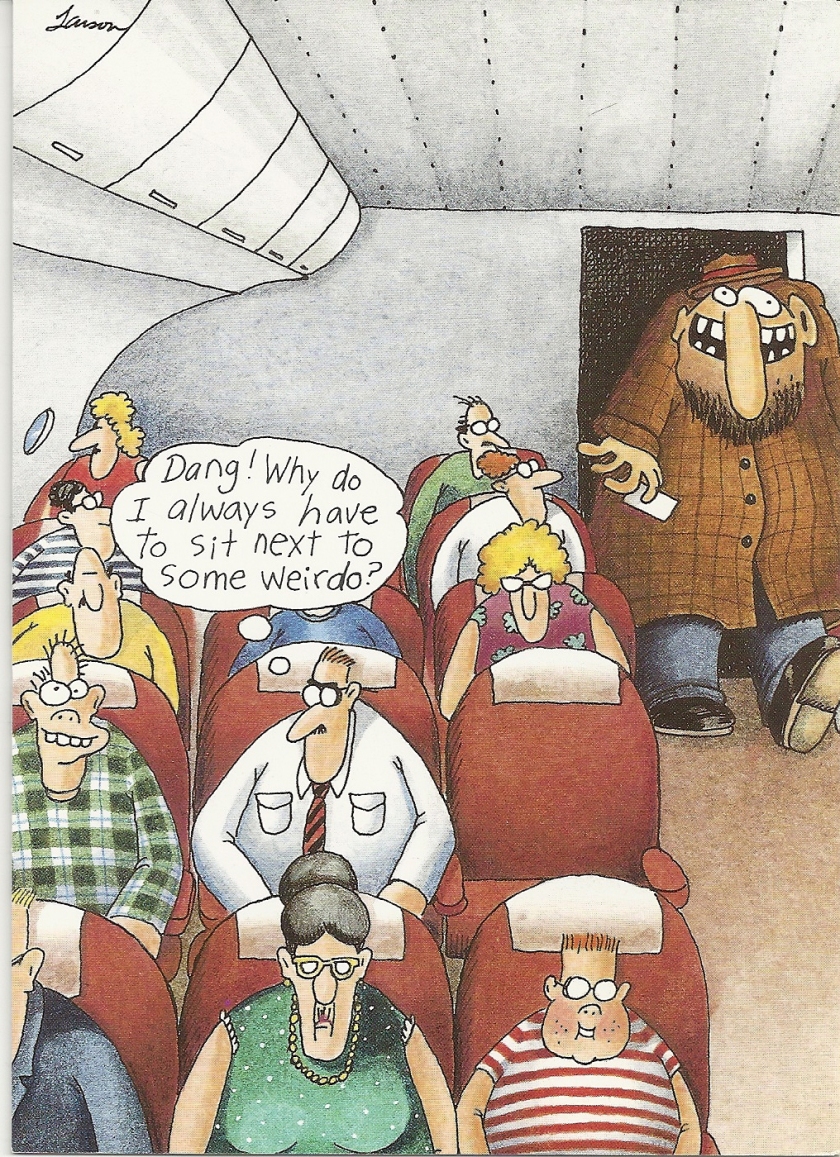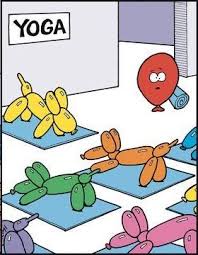
Cartoon by Gary Larsson
It seems I’m in the habit of writing about plane journeys. But on a flight yesterday it was the peculiar lottery of seat allocation that got me thinking.
I’m a big fan of Gary Larsson cartoons and this one has always struck a particular chord. Who would be my armrest sharer for the next several hours, as we float about at 35,000 feet?
My husband always sits across the aisle from me – neither of us likes to have to ask our neighbour to fold their tray to the upright position to let us pass when it’s full of goodies that can barely be squeezed onto its already inclined surface.
And a window seat isn’t all its cracked up to be when the view is as exciting as that blue painting by Barnett Newman that once sold for $43 million at Sotheby’s.
So yesterday my husband got a young couple with a baby. “Aren’t I the lucky one?” he muttered as they approached down the aisle. They were late boarding, so he’d been smug about having three seats to himself.
The Dad was of that generation when it was fashionable to reveal the brand of your underpants by allowing the unnecessarily thick waistband to peep above the jeans. Except in his case, perhaps because he was very thin, his jeans had slid down further to the low-slung crotch position that makes walking a challenge. Especially walking with a baby strapped to your thorax.
On arrival the baby was released and plonked onto the middle seat, where it sat delighted in a perfect L-shape with its cherubic legs pointed towards Gatwick – as my tall husband waited in the S-bend position in the aisle.
Meanwhile I was a bit nervous about my own neighbour who was a strange bewhiskered old man who looked like a hybrid of several characters from The Hobbit. He was slight but multiple layers of clothing and a lot of fidgeting made him feel like a larger man.
I’d watched as he was helped into position by the steward as one might arrange a foldable but fragile artwork. The effort seemed to overwhelm him and for a while his wisp-covered chin dropped down into a dead-flop position that almost had me reaching for the call button.
As we taxied towards take-off, I surprised myself by suddenly asking him if his seatbelt was fastened. Not sure what brought on this mumsy moment, but he wearily lifted his upper layers to show me that it was.
Across the aisle the L-shaped baby had been lifted and resettled onto its mother’s lap by the window, with underpants Papa in the middle. It was one of those starers. In that way you often wish as an adult you could stare. Perhaps at some peculiarity – a very long nose or the unusual contents of someone’s sandwich.
Then I realised who it reminded me of. The retired England rugby player who’s now a team captain on TV’s most boring programme A Question of Sport, Matt Dawson.
Baby Dawson was not only bald but had a freakishly large head. I hoped he was going to be a genius. But I also worried for whichever parent might be holding him in the event of major turbulence in case a rapid head movement knocked them unconscious.
Now Thorin’s grandad began the first of many trembly rummages. It was almost Mr Bean-esque, although I’m not sure his tongue actually came out during the process. After about ten minutes he extricated a small folded section of newsprint from his jacket pocket which turned out to be the Culture section of a broadsheet paper.
He later ordered a double Bacardi and single Coke and sat with it poured out untouched as he drummed his fingers on the tray and allowed his head to flop again. I’m pleased to say he was still alive when we disembarked.
Of course, armrest neighbours can be a pleasant surprise. My best ever was one of those people who raise your spirits for the rest of the day and beyond. A delightful bright-eyed 70-something lady who’d run an independent bookshop in a Sussex village. I could have listened to her all the way to Buenos Aires, but sadly we were only going to Malaga.














